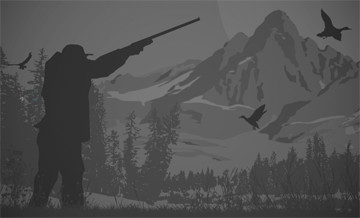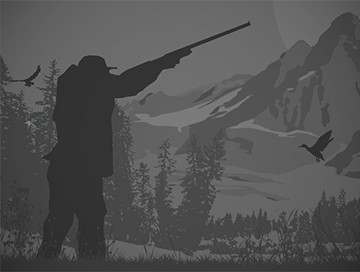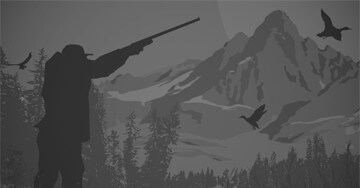Hunting in Zimbabwe
View 60 hunts View all hunts60 hunting trips from 6 outfitters starting from C$5,680
Zimbabwe on map
About hunting in Zimbabwe
Zimbabwe, situated in the heart of southern Africa, is one of the continent’s most storied safari destinations. The country contains a wide variety of terrain and habitat, from the Zambezi Valley in the north to the game-rich Lowveld in the south. Zimbabwe’s lengthy list of huntable game includes African wild cat, baboon, jackal, buffalo, klipspringer, kudu, bushbuck, bushpig, leopard, caracal, lion, civet cat, crocodile, nyala, duiker, eland, sable, elephant, serval cat, genet cat, steenbok, giraffe, grysbok, warthog, hippo, waterbuck, wildebeest, hyena, and zebra. The Zambezi Valley in particular is a major draw for big-game hunters, known for huge herds of elephants and one of the highest concentrations of Cape buffalo in Africa, as well as good populations of lions and leopards. The islands and marshes along the Zambezi also offer the opportunity to hunt hippos and crocodiles. A number of large, privately owned conservancies, including the Save and the Bubye Valley conservancies, also provide excellent hunting opportunities for plains game and dangerous game. Many of these conservancies started out as traditional farms and later banded together to create large, unbroken tracts of wildlife habitat.
Let Africa Inspire You and BookYourHunt Make it Reality!
Africa's plentiful and diverse wildlife offers a new adventure whether you're a first time African hunter or a seasoned veteran of many safaris. BookYourHunt has your first safari, or your next safari.
What you need to know
-
1. Planning your trip
-
2. Upon arrival
-
3. Hunting
-
4. After the hunt
Planning your trip
Visas
If you are traveling to Zimbabwe to hunt, you may obtain a visa upon arrival at the airport. You can expect to pay $30 US for a 30-day/single-entry visa or $60 US for a 60-day/multiple entry visa.
Health
Malaria is present in many of Zimbabwe’s hunting areas, and malaria prophylaxis is highly recommended for all hunters.
Firearms permits
Application for a temporary firearm import permit for Zimbabwe can be made on arrival at the port of entry. There is no fee for issuing a firearm permit. Firearms import into Zimbabwe is fairly easy and straightforward, but traveling to Zimbabwe through other countries with firearms is not.
According to EU Regulation (EC) No 314/2004, the importation of firearms and ammunition, including those for hunting/sporting purposes, from the E.U. into Zimbabwe is prohibited. European and British airlines will not carry firearms of any kind on flights direct to Zimbabwe. If you want to take firearms into Zimbabwe and you are flying from an EU country, it will be necessary to get two sets of tickets issued; one set for Johannesburg and another set for the onward flight to Zimbabwe. Canada has also implemented a ban on all firearms going to Zimbabwe, which includes hunting firearms. Because of this, you will likely travel through South Africa to enter Zimbabwe, and you will have to go through the process to clear your firearms in South Africa, which has strict firearms import procedures, and then re-check them for your flight to Zimbabwe.
Upon arrival
Most hunters arrive at the airport in Harare, Zimbabwe. In most cases, it’s necessary to take a charter flight from Harare to the hunting area. You should make arrangements to be met at the Harare airport by your outfitter or a charter pilot, who will assist you through the firearms permitting and customs process.
It’s important to note that due to a cash liquidity crisis in Zimbabwe, the Reserve Bank of Zimbabwe (RBZ) has announced a series of measures designed to stem the flow of U.S. dollars out of the country. Tourists and visitors who do not have bank accounts in Zimbabwe should plan to bring sufficient cash with them for the duration of their trip. Expenses such as hotels, flights, and tours should be prepaid or paid for by credit or debit card. Hunters need to declare the amount of cash they are entering the country with and get a blue-colored receipt issued by the Zimbabwe Revenue Authority or they risk having any remaining cash seized upon leaving the country.
Hunting
Most hunts in Zimbabwe are safari style, with hunters covering ground in a vehicle, and then, when an animal or fresh tracks are spotted, completing a stalk or tracking job on foot. Some safaris require extensive walking; others require very little, so it’s a good idea to ask the professional hunter.
Dark green or brown clothing is best, as are boots with soft soles for quiet stalking. Bring a wide-brimmed hat, sunblock, good optics, and a jacket for cool mornings and evenings. Most professionals recommend rifles in the .300-caliber family for plains game and .375 and up for dangerous game, but the most important thing is to bring a rifle you are familiar with and can shoot well. Due to thick brush (called jess), shots in many areas can be fairly close-range.
After the hunt
Tips
Tips are appreciated at most safari camps in Zimbabwe; in addition to the professional hunter, trackers, driver, and skinners, there are usually staff members at camp who handle cooking and cleaning and other chores and help to make a hunter’s stay pleasant. The professional hunter or outfitter can advise how much is appropriate to tip each staff member.
Tag your skulls and skins
Typically, animals are skinned at the safari headquarters and all skins are cleaned and salted, skulls and horns are cleaned and buried in salt, then the skins are folded and stored in a skinning shed. Before leaving camp, it’s a good idea to ensure your skulls and skins are properly tagged with your name and contact information.
Taxidermy
Once the hunter departs, or at the end of the season, trophies will be taken to a taxidermist for professional cleaning and dipping, which is required for export. The taxidermist then contacts the hunter for instructions regarding preparation and shipment and to arrange payment for these services. A shipping agent then handles the permits and shipping to the hunter’s home country.
Always check the latests regulations
It’s very important that hunters check the latest regulations in order to make arrangements in advance if they are hunting species that require CITES permits or other special export or import permits from the hunter’s home country. Many export and import requirements, especially for Big Five species, have undergone dramatic changes in the past couple of years.
Price distribution
Reviews
Interested in this destination? Create a subscription to get offers right to your inbox




